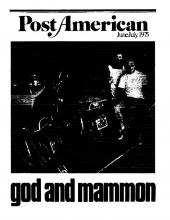Those who possess money and property usually feel they have the right to use these things for their own benefit. But this is not the way of Christian love. The true Christian must overcome this accepted way of life. Instead, the Christian realizes that even though certain assets may be possessed or con trolled, they are not to be used at will. This was given its classical expression in the early days of the church when, “no one said that any of the things which he possessed were his own” (Acts 4:32).
This makes it clear that the crucial issue for Christians is not a particular form of common ownership but a unique form of common consumption. To have “all things in common” did not mean that no one any longer “possessed” any thing. Because of circumstances and customs, the disposition of material assests will usually fall into the hands of certain specific people. There the early Christians still speak about the things which various believers “possessed.”
The unique thing was not that no one possessed anything, but that no one said that any of the things possessed were their own. Thus the spirit of love broke through the ordinary barriers of the economic order. The believers under stood that, even though they legally held title to certain assets, this did not mean that these assets were to be disposed of at their own private discretion. Rather, they understood that this property was at the disposal of the entire brotherhood, according to need.
This is the Christian concept of consumption. It does not depend so much on the reshuffling of title deeds or the placing of all money in a single bank account (although these in some cases may be helpful), as upon the willingness of each member to put entire resources at the disposal of the church.
Read the Full Article

